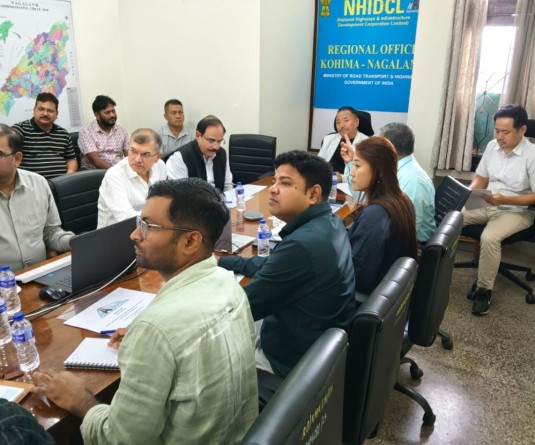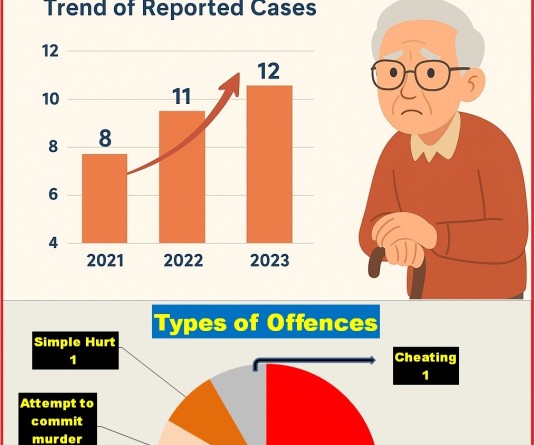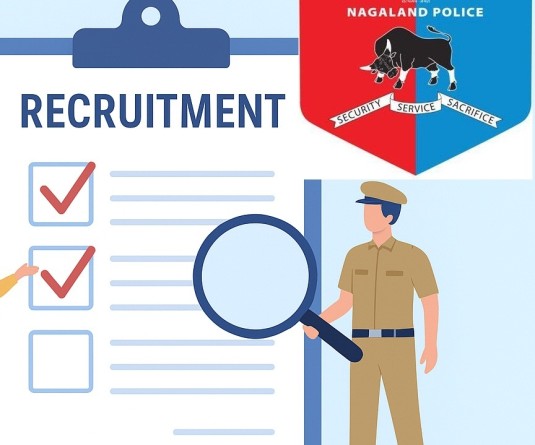Dr SC Jamir with the media fraternity in Dimapur during the National Press Day celebration on November 16. (Morung Photo by Manen Aier)
.jpg)
Morung Express News
Dimapur | November 16
The Naga society’s obsession with the past and politics has led to the neglect of economic development, social reformation and cultural enlightenment, according to Padma Bhushan Dr SC Jamir.
Addressing media persons on National Press Day at DIDBL Hall on Tuesday, the former Governor and 5 times Nagaland Chief Minister posed a challenge for the Nagas to take pride in their past and make history in the present.
Sharing his vision for Nagaland, he said that the Naga society is in a state of confusion with neither the government, the ‘underground,’ the churches, or civil society organisations, having a clear direction on where it is heading. Despite all the talk about advancement in science and technology, the digital age, etc, he maintained that the Naga people are ‘too obsessed’ with the past.
History, he said, should be used as a point of reference, in order to create new history. “I think Nagas should have forward thinking attitude and vision,” he added.
He also observed that the Naga society has an obsession with politics which has led to the neglect of economic development, social reformation and cultural enlightenment, and underscored the urgent need to “escape from this dangerous trend” prevailing in Nagaland. There is so much talk about unity but we are getting further and further divided, he added while asserting that “Negativism has to give way to positivism.”
Expressing concern over the lack of normalcy in the state, the veteran leader stated that Nagaland is a state with ‘confused governance with so many authorities.’
“The younger generation have got the potentialities to survive, to work and compete but where is the space for that?” he asked.
Nagaland, he said, is a state of prime ministers, commander-in-chiefs and presidents where the elected government and the constitutional authority have been ‘thoroughly undermined,’ while lamenting that “no one has the courage to say that we are living in an abnormal situation.”
He appealed the people of Nagaland to wake up, see the reality and march hand in hand with the rest of the country and make Nagaland a model state.
Dr SC Jamir further urged the press to be messengers of truthfulness, reality and unity among Naga people.
Instil admiration, not fear
Touching upon the theme set by the Press Council of India (PCI), the veteran leader noted that the ‘thorny’ relationship between the government and the press has been debated, discussed, and deliberated on many occasions and various commentaries were made by different commentators and writers. “But what is important today is the relationship between the press and the people,” he underscored.
The focus for the press in the state, he said, should be on highlighting the problems of the common people and their welfare instead of speeches of politicians. Focussing only on political personalities, he observed, would confine and limit the influence of the press. However, when the people feel that their interests and difficulties are also highlighted, the popularity of the press would also increase, he observed.
The aim should be to instil a sense of admiration for the press instead of creating a narrative of fear among the people, he opined.
Dr SC Jamir also noted that world is moving very fast particularly in the field of science and technology. The modern society has become an information society where every citizen is equally interested in getting the latest information of not only the country but also the whole world. In this context, he stated that the information that reaches the common people should be comprehensive, accurate and as far as possible, fair.
The idea of right to information has become paramount in our society but we should remember that the fundamental rights provided in the Constitution of India, are subject to certain codes of conduct pertaining to security, decency and morality. “Our privileges, our rights have to be matched with our obligations and with our responsibilities,” he added.
On Naga political issue
Briefly making a reference to the Naga political issue, Dr SC Jamir acknowledged that the Framework Agreement of August 3, 2015 and the Agreed Position of November 17, 2017 were both signed in the best interest of the people of the state.
After so many years of negotiations, we should also be grateful to the leaders of the Naga political groups for having seen the contemporary realities in politics and economics. “In their own wisdom, and their political foresight, they also have accepted the reality of the world, of the Indian and Naga society and they have also recognised the unique position of India in geopolitical international affairs,” he said. It is this acceptance that has led to the signing of the two agreements with the Government of India in the presence of the Prime Minister, he maintained.
Referring to Prime Minister Narendra Modi’s statement after signing the FA in 2015, where he welcomed the leader of the NPGs for joining “the mainstream of Indian polity,” Dr SC Jamir said that “we are a part and parcel of this great nation.”
With regard to the Agreed Position, he said that the document has mentioned “neither sovereignty nor integration.” In both the agreements, they have realised, recognised the contemporary political realities and both the leaders of NPGs and the Government of India have drawn up these agreements in the best interest of the people of Nagaland and Government of India, he maintained.
Stating that the Naga people are politically conscious enough to accept what is real, “Is it not the time for the Naga people to come forward, wake up and see the reality of the situation in the country, in the world and in Nagaland?” he posed.






